外研版(2019)选择性必修第二册Unit 1 Growing up Using language课件(共37张PPT)
文档属性
| 名称 | 外研版(2019)选择性必修第二册Unit 1 Growing up Using language课件(共37张PPT) |

|
|
| 格式 | pptx | ||
| 文件大小 | 1.6MB | ||
| 资源类型 | 教案 | ||
| 版本资源 | 外研版(2019) | ||
| 科目 | 英语 | ||
| 更新时间 | 2023-11-05 00:00:00 | ||
图片预览

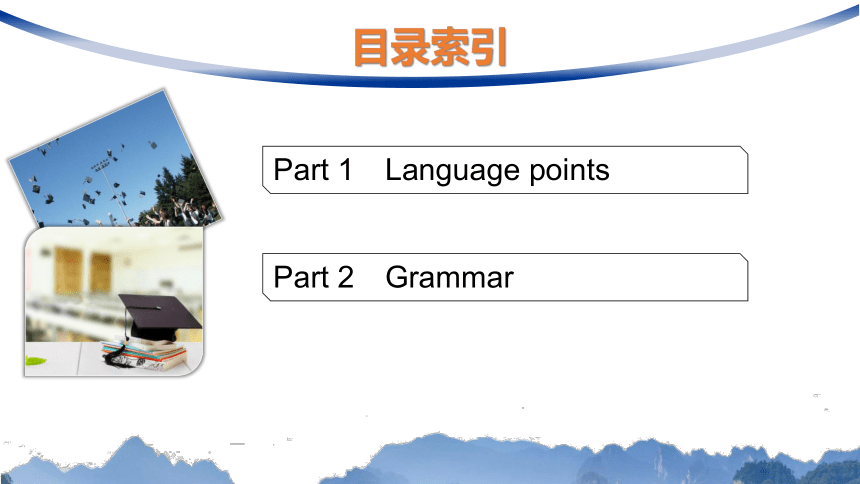
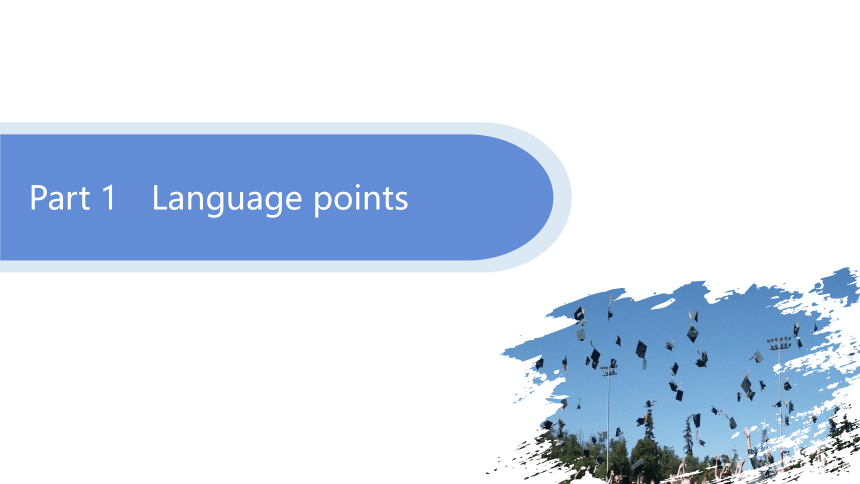
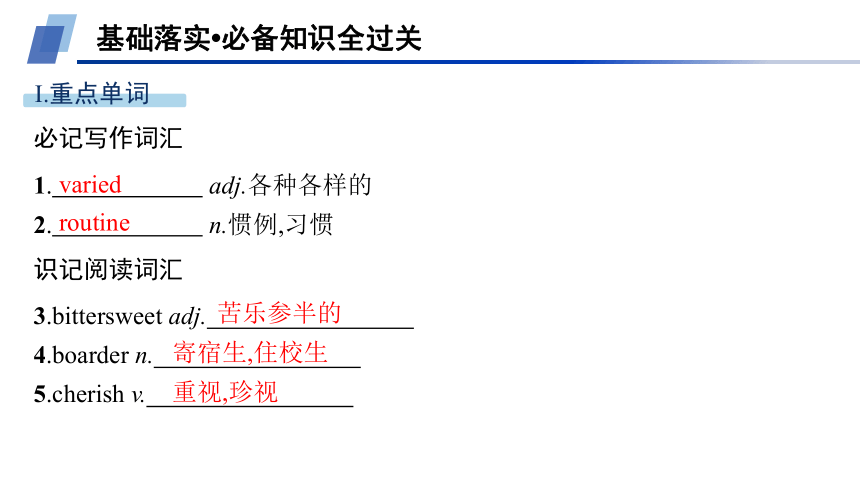
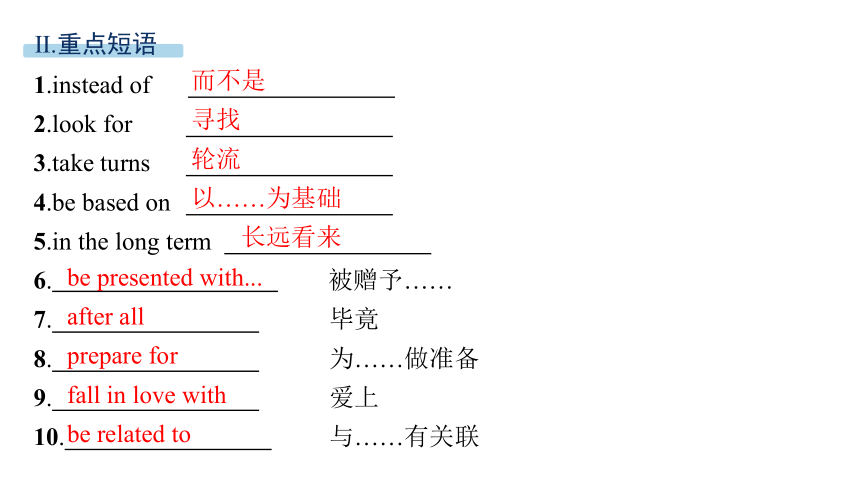
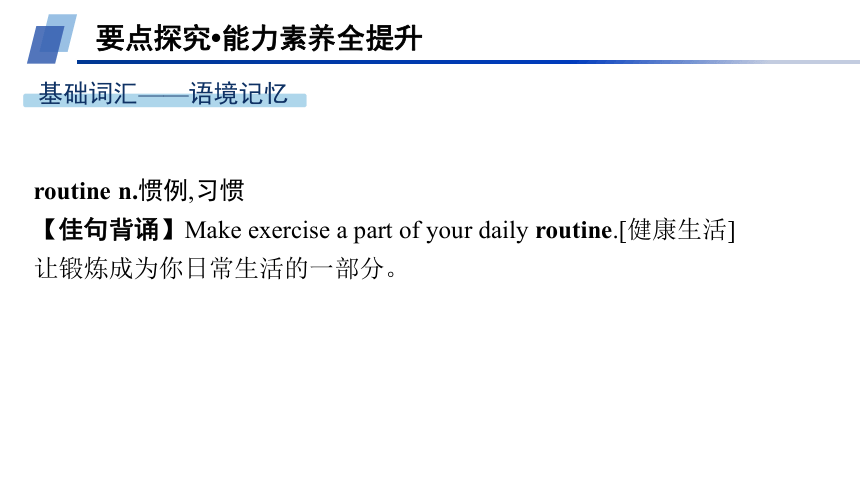
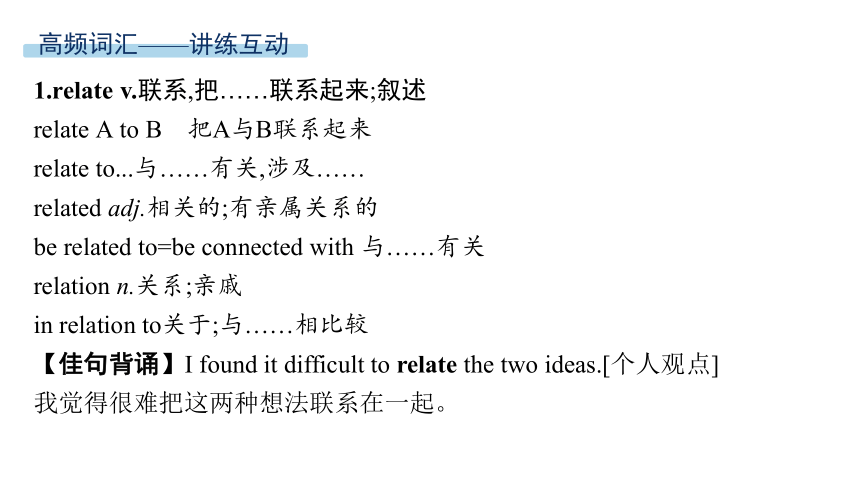
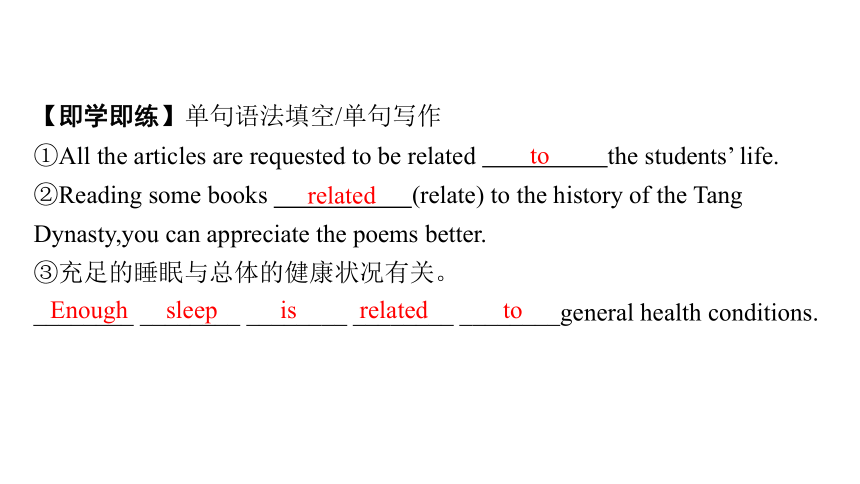
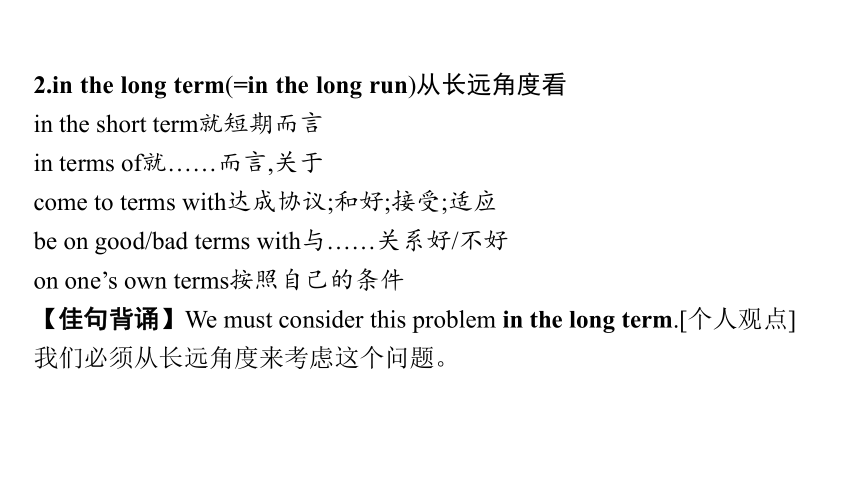
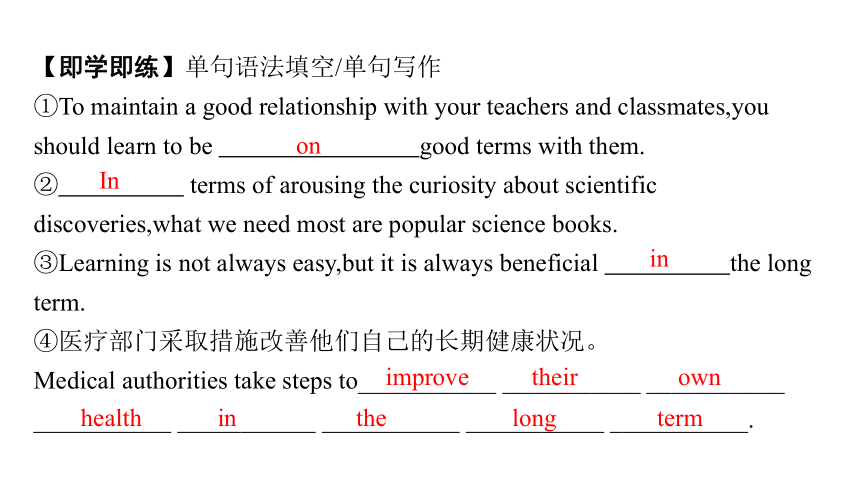
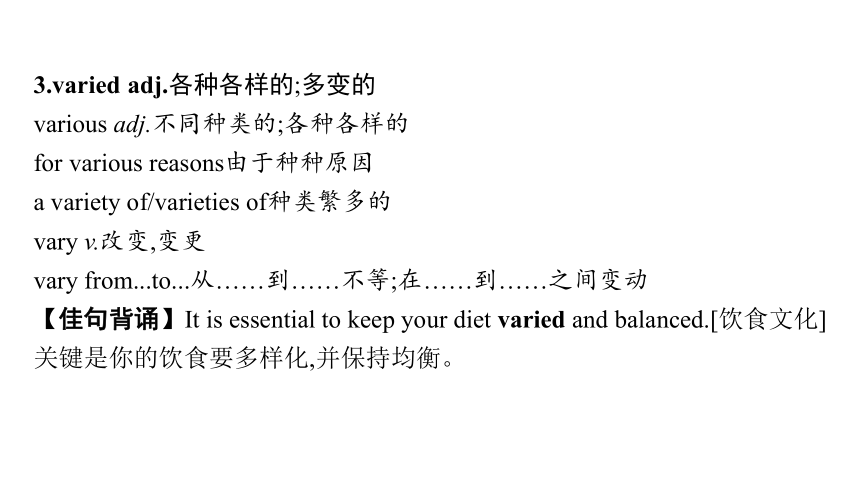
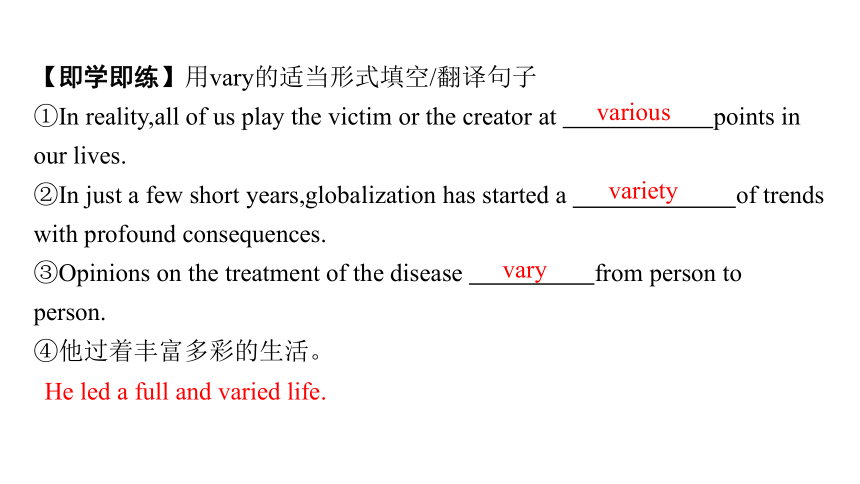
文档简介
(共37张PPT)
UNIT 1
Section B Using language
Part 1 Language points
Part 2 Grammar
目录索引
Part 1 Language points
基础落实 必备知识全过关
Ⅰ.重点单词
必记写作词汇
1. adj.各种各样的
2. n.惯例,习惯
识记阅读词汇
3.bittersweet adj.
4.boarder n.
5.cherish v.
varied
routine
苦乐参半的
寄宿生,住校生
重视,珍视
Ⅱ.重点短语
1.instead of
2.look for
3.take turns
4.be based on
5.in the long term
6. 被赠予……
7. 毕竟
8. 为……做准备
9. 爱上
10. 与……有关联
而不是
寻找
轮流
以……为基础
长远看来
be presented with...
after all
prepare for
fall in love with
be related to
要点探究 能力素养全提升
基础词汇——语境记忆
routine n.惯例,习惯
【佳句背诵】Make exercise a part of your daily routine.[健康生活]
让锻炼成为你日常生活的一部分。
高频词汇——讲练互动
1.relate v.联系,把……联系起来;叙述
relate A to B 把A与B联系起来
relate to...与……有关,涉及……
related adj.相关的;有亲属关系的
be related to=be connected with 与……有关
relation n.关系;亲戚
in relation to关于;与……相比较
【佳句背诵】I found it difficult to relate the two ideas.[个人观点]
我觉得很难把这两种想法联系在一起。
【即学即练】单句语法填空/单句写作
①All the articles are requested to be related the students’ life.
②Reading some books (relate) to the history of the Tang Dynasty,you can appreciate the poems better.
③充足的睡眠与总体的健康状况有关。
________ ________ ________ ________ ________general health conditions.
to
related
Enough sleep is related to
2.in the long term(=in the long run)从长远角度看
in the short term就短期而言
in terms of就……而言,关于
come to terms with达成协议;和好;接受;适应
be on good/bad terms with与……关系好/不好
on one’s own terms按照自己的条件
【佳句背诵】We must consider this problem in the long term.[个人观点]
我们必须从长远角度来考虑这个问题。
【即学即练】单句语法填空/单句写作
①To maintain a good relationship with your teachers and classmates,you should learn to be good terms with them.
② terms of arousing the curiosity about scientific discoveries,what we need most are popular science books.
③Learning is not always easy,but it is always beneficial the long term.
④医疗部门采取措施改善他们自己的长期健康状况。
Medical authorities take steps to___________ ___________ ___________ ___________ ___________ ___________ ___________ ___________.
on
In
in
improve their own
health in the long term
3.varied adj.各种各样的;多变的
various adj.不同种类的;各种各样的
for various reasons由于种种原因
a variety of/varieties of种类繁多的
vary v.改变,变更
vary from...to...从……到……不等;在……到……之间变动
【佳句背诵】It is essential to keep your diet varied and balanced.[饮食文化]
关键是你的饮食要多样化,并保持均衡。
【即学即练】用vary的适当形式填空/翻译句子
①In reality,all of us play the victim or the creator at points in our lives.
②In just a few short years,globalization has started a of trends with profound consequences.
③Opinions on the treatment of the disease from person to person.
④他过着丰富多彩的生活。
various
variety
vary
He led a full and varied life.
【温馨提示】
①varied和various在表示“各种各样的”时一般可换用,只是前者侧重于“不同”含义,后者则侧重于种类数目的“多”。
②various作定语时,其后通常接复数名词;而varied还有“多变的”之意,这时它既可接单数名词也可接复数名词。
重点句式——多维剖析
1.now that既然(引导原因状语从句)
【教材原句】You asked if I have been thinking a lot about the future now that I’m 17.
你问我既然17岁了,是否一直对未来思考很多。
①now that相当于since,表示“既然”。如同although/though不与but连用,because不与so连用一样,当since,now that引导的从句表原因时,主句前不能加so。
②常见的引导原因状语从句的从属连词有:because,since,for,as,considering (that)等。
【佳句背诵】They are hoping for a return to normality now that the war is over.[事件介绍]
既然战争结束了,他们希望一切都恢复常态。
【即学即练】用now that或for填空/翻译句子
①He found it increasingly difficult to read, his eyesight was beginning to fail.
② you’ve got a chance,you might as well make full use of it.
③既然你已经准备好了,那我们现在就出发吧。
for
Now that
Now that you are ready,we set off now.
2.It’s likely that...很可能……
【教材原句】As students,it’s likely that those moments are mainly about school life,such as sitting a major exam,giving a presentation,or becoming a boarder for the first time.
作为学生,那些时刻很可能主要与学校生活有关,比如参加一场重要考试、做一次演讲或第一次成为寄宿生。
常见的It+be+adj.+that句式:It+be+important/strange/surprising/impossible/necessary/urgent/natural...+that...
【佳句背诵】It’s very likely that you’ll want to have volunteers to help with the organization’s activities.[志愿活动]
可能你需要志愿者帮助此组织的活动。
【即学即练】单句语法填空/一句多译
①People are more (like) to suffer from back problems if they always sit before computer screens for long hours.
②A number of students are likely (admit) to universities.
他很可能要放弃这次选举。
→③He give up the election.
→④ him to give up the election.
→⑤ he will give up the election.
likely
to be admitted
is likely to
It is possible for
It is likely/possible/probable that
Part 2 Grammar
情景导入
将来进行时
阅读下列句子,注意黑体部分的用法。
1.Travelling in space by ordinary citizens will be common.
2.I shall be having a meeting at this time tomorrow.
3.They will be lying on the beach across the Atlantic at 5 o’clock this afternoon.
4.All forms of recreation such as cinemas,bowling,softball,concerts and others,will be provided free of charge by the city.
5.But one thing is certain—they are going to get bigger before they get smaller.
6.In the year 3000 a lot of people will be living on space stations.
【语法感悟】
1. 句用了将来进行时, 句用了一般将来时。
2.将来进行时的构成: 。
3.将来进行时表示将来某个时间 ,而一般将来时表示
。
②③⑥
①④⑤
shall/will be doing
正在做某事
将来要做的事
语法精讲
一、概念
将来进行时主要表示将来某一时间正在进行的动作,或表示要在将来某一时间开始并继续下去的动作。常用来表示礼貌的询问、请求等。
二、构成
1.将来进行时的肯定句
将来进行时的肯定句由助动词shall/will+助动词be+现在分词构成。
句型:主语+shall/will+be+现在分词...
Hurry up!The guests will be arriving at any minute!
快!客人随时就要来!
We shall be landing in Paris in sixteen minutes.
我们将在16分钟后在巴黎降落。
2.将来进行时的否定句
句型:主语+shall/will+not+be+现在分词...
将来进行时的否定句是在助动词shall/will之后加not。
The train won’t be leaving until one.
火车1点钟才开。
Anyhow,you won’t be playing for the next few Saturdays.
无论如何,接下来的几个星期六你不许再玩了。
3.将来进行时的一般疑问句
句型: Shall/Will+主语+be+现在分词...
回答方式:Yes,主语+shall/will+be+现在分词...
No,主语+shall/will+not+be+现在分词...
将来进行时的一般疑问句是将助动词shall/will置于主语之前(大写shall/will的第一个字母),在句尾加问号。
—Will you be remaining in the city
——你将来会留在这个城市吗
—Yes,I will be(remaining in the city).
——是,我会(留在这个城市)。
—Will they be coming this way
——他们会顺着这条路来吗
—No,they won’t be(coming this way).
——不,他们不会从这条路来。
—Will you be coming tomorrow
——你明天会来吗
—I guess so.
——我想会来的。
4.将来进行时的特殊疑问句
句型:疑问词+ shall/will + 主语 +be+ 现在分词...
将来进行时的特殊疑问句是将疑问词或带有疑问限定词的名词词组置于助动词shall/will之前,剩余部分和一般疑问句差不多。就主语提问时,将疑问词或带有疑问限定词的名词词组置于助动词shall/will之前,在句尾加问号,这种语序是陈述句语序。
—Who will be looking after Joe
——谁来照顾乔
—Don’t worry!Mr.Frith will be looking after him.He said he would.
——别担心!弗里斯先生会照顾他的。他说他会的。
—What time will she be arriving
——她什么时候到达
—She will be arriving at about 8:30 tomorrow morning.
——她大概明天上午8点半到达。
—How long will you be staying here
——你将在这里住多久
—I’ll be staying here for half a year.
——我将在这里住半年。
三、将来进行时的用法
1.表示将来某一时刻或某一阶段内将要发生的动作
一般只用于动态动词,不能用于静态动词。
She’ll be leaving at about seven.
她将在大约7点钟离开。
I’ll be waiting for you at the gate.
我将在大门口等你。
Be sure to come.We’ll be expecting you.
一定要来,我们会等你的。
2.表示将来某一段时间内持续发生的动作
I shall be staying here for a week.
我将在这里住一星期左右。
He will be working in Geneva during the summer vacation.
暑假期间他将在日内瓦工作。
We’ll be using this book next term.我们下学期将用这本书。
3.用于现代英语口语中,表示“纯粹”的将来,该时态比一般将来时显得语气委婉
When will you be visiting us again (比较委婉)
When will you visit us again (一般说法)
你什么时候再来拜访我们
【即学即练】单句写作
1.星期五你可以在我的办公室开会。那会儿我不用它。
You can have a meeting in my office on Friday.I_________ _________
_________ _________then.
2.我非常兴奋。两天后我就要见到我的姐姐和她一家。
I feel so excited!I_________ _________ _________ _________ _________
_________ _________ _________in two days.
won’t be
using it
will be seeing my sister
and her family
3.她不在时,她的丈夫将照料这些孩子们。
Her husband________ ________ ________ ________ ________ ________ ________ while she is away.
4.下星期的这个时候我就会在清华大学的教室里学习了。
This time next week I __________ __________ __________ __________
__________ __________ of Tsinghua University.
will be taking care of the
children
will be studying in
the classroom
四、将来进行时与其他时态的区别
1.与现在进行时态的区别
现在进行时表示一种经过考虑的、将来要进行的动作,而将来进行时通常表示正常过程中会发生的动作,因此将来进行时不如现在进行时那样肯定,偶然性要大一些。
I am seeing Tom tomorrow.
明天我要和汤姆见面。
I’ll be seeing Tom tomorrow.
明天我会见到汤姆。
第一句意指汤姆或说话人已经特意安排了这次会面,而第二句则意指汤姆和说话人将在通常进程中见面(也许他们在一起工作);不过这种差别并不是在任何情况下都很重要,而且常常两者都可以使用;现在进行时用于表示最近将来的动作时,必须有确定的时间,而将来进行时可以和确定的时间状语连用,也可以不连用,它既可以表示最近将来发生的动作,也可以表示较远将来发生的动作。
2.与一般将来时态的区别
will+v.(一般将来时)除表示时间概念外,还带有感彩;将来进行时则表示在将来特定的某个时间发生的事情。如:
Tom will be cutting the grass tomorrow.
汤姆明天将割草。
Tom will cut the grass tomorrow.
汤姆明天愿意割草。
【即学即练】单句语法填空
1.—Can I call you back at two o’clock this afternoon
—I’m sorry,but by then I (fly) to Beijing.How about five
2.—What time is it
—I have no idea.But just a minute,I (check) it for you.
3.She (be) twenty-four years old next year.
4.At 10 o’clock tomorrow,she (be) in her office and she
(write) a report for the manager.
will be flying
will check
will be
will be
will be writing
本 课 结 束
UNIT 1
Section B Using language
Part 1 Language points
Part 2 Grammar
目录索引
Part 1 Language points
基础落实 必备知识全过关
Ⅰ.重点单词
必记写作词汇
1. adj.各种各样的
2. n.惯例,习惯
识记阅读词汇
3.bittersweet adj.
4.boarder n.
5.cherish v.
varied
routine
苦乐参半的
寄宿生,住校生
重视,珍视
Ⅱ.重点短语
1.instead of
2.look for
3.take turns
4.be based on
5.in the long term
6. 被赠予……
7. 毕竟
8. 为……做准备
9. 爱上
10. 与……有关联
而不是
寻找
轮流
以……为基础
长远看来
be presented with...
after all
prepare for
fall in love with
be related to
要点探究 能力素养全提升
基础词汇——语境记忆
routine n.惯例,习惯
【佳句背诵】Make exercise a part of your daily routine.[健康生活]
让锻炼成为你日常生活的一部分。
高频词汇——讲练互动
1.relate v.联系,把……联系起来;叙述
relate A to B 把A与B联系起来
relate to...与……有关,涉及……
related adj.相关的;有亲属关系的
be related to=be connected with 与……有关
relation n.关系;亲戚
in relation to关于;与……相比较
【佳句背诵】I found it difficult to relate the two ideas.[个人观点]
我觉得很难把这两种想法联系在一起。
【即学即练】单句语法填空/单句写作
①All the articles are requested to be related the students’ life.
②Reading some books (relate) to the history of the Tang Dynasty,you can appreciate the poems better.
③充足的睡眠与总体的健康状况有关。
________ ________ ________ ________ ________general health conditions.
to
related
Enough sleep is related to
2.in the long term(=in the long run)从长远角度看
in the short term就短期而言
in terms of就……而言,关于
come to terms with达成协议;和好;接受;适应
be on good/bad terms with与……关系好/不好
on one’s own terms按照自己的条件
【佳句背诵】We must consider this problem in the long term.[个人观点]
我们必须从长远角度来考虑这个问题。
【即学即练】单句语法填空/单句写作
①To maintain a good relationship with your teachers and classmates,you should learn to be good terms with them.
② terms of arousing the curiosity about scientific discoveries,what we need most are popular science books.
③Learning is not always easy,but it is always beneficial the long term.
④医疗部门采取措施改善他们自己的长期健康状况。
Medical authorities take steps to___________ ___________ ___________ ___________ ___________ ___________ ___________ ___________.
on
In
in
improve their own
health in the long term
3.varied adj.各种各样的;多变的
various adj.不同种类的;各种各样的
for various reasons由于种种原因
a variety of/varieties of种类繁多的
vary v.改变,变更
vary from...to...从……到……不等;在……到……之间变动
【佳句背诵】It is essential to keep your diet varied and balanced.[饮食文化]
关键是你的饮食要多样化,并保持均衡。
【即学即练】用vary的适当形式填空/翻译句子
①In reality,all of us play the victim or the creator at points in our lives.
②In just a few short years,globalization has started a of trends with profound consequences.
③Opinions on the treatment of the disease from person to person.
④他过着丰富多彩的生活。
various
variety
vary
He led a full and varied life.
【温馨提示】
①varied和various在表示“各种各样的”时一般可换用,只是前者侧重于“不同”含义,后者则侧重于种类数目的“多”。
②various作定语时,其后通常接复数名词;而varied还有“多变的”之意,这时它既可接单数名词也可接复数名词。
重点句式——多维剖析
1.now that既然(引导原因状语从句)
【教材原句】You asked if I have been thinking a lot about the future now that I’m 17.
你问我既然17岁了,是否一直对未来思考很多。
①now that相当于since,表示“既然”。如同although/though不与but连用,because不与so连用一样,当since,now that引导的从句表原因时,主句前不能加so。
②常见的引导原因状语从句的从属连词有:because,since,for,as,considering (that)等。
【佳句背诵】They are hoping for a return to normality now that the war is over.[事件介绍]
既然战争结束了,他们希望一切都恢复常态。
【即学即练】用now that或for填空/翻译句子
①He found it increasingly difficult to read, his eyesight was beginning to fail.
② you’ve got a chance,you might as well make full use of it.
③既然你已经准备好了,那我们现在就出发吧。
for
Now that
Now that you are ready,we set off now.
2.It’s likely that...很可能……
【教材原句】As students,it’s likely that those moments are mainly about school life,such as sitting a major exam,giving a presentation,or becoming a boarder for the first time.
作为学生,那些时刻很可能主要与学校生活有关,比如参加一场重要考试、做一次演讲或第一次成为寄宿生。
常见的It+be+adj.+that句式:It+be+important/strange/surprising/impossible/necessary/urgent/natural...+that...
【佳句背诵】It’s very likely that you’ll want to have volunteers to help with the organization’s activities.[志愿活动]
可能你需要志愿者帮助此组织的活动。
【即学即练】单句语法填空/一句多译
①People are more (like) to suffer from back problems if they always sit before computer screens for long hours.
②A number of students are likely (admit) to universities.
他很可能要放弃这次选举。
→③He give up the election.
→④ him to give up the election.
→⑤ he will give up the election.
likely
to be admitted
is likely to
It is possible for
It is likely/possible/probable that
Part 2 Grammar
情景导入
将来进行时
阅读下列句子,注意黑体部分的用法。
1.Travelling in space by ordinary citizens will be common.
2.I shall be having a meeting at this time tomorrow.
3.They will be lying on the beach across the Atlantic at 5 o’clock this afternoon.
4.All forms of recreation such as cinemas,bowling,softball,concerts and others,will be provided free of charge by the city.
5.But one thing is certain—they are going to get bigger before they get smaller.
6.In the year 3000 a lot of people will be living on space stations.
【语法感悟】
1. 句用了将来进行时, 句用了一般将来时。
2.将来进行时的构成: 。
3.将来进行时表示将来某个时间 ,而一般将来时表示
。
②③⑥
①④⑤
shall/will be doing
正在做某事
将来要做的事
语法精讲
一、概念
将来进行时主要表示将来某一时间正在进行的动作,或表示要在将来某一时间开始并继续下去的动作。常用来表示礼貌的询问、请求等。
二、构成
1.将来进行时的肯定句
将来进行时的肯定句由助动词shall/will+助动词be+现在分词构成。
句型:主语+shall/will+be+现在分词...
Hurry up!The guests will be arriving at any minute!
快!客人随时就要来!
We shall be landing in Paris in sixteen minutes.
我们将在16分钟后在巴黎降落。
2.将来进行时的否定句
句型:主语+shall/will+not+be+现在分词...
将来进行时的否定句是在助动词shall/will之后加not。
The train won’t be leaving until one.
火车1点钟才开。
Anyhow,you won’t be playing for the next few Saturdays.
无论如何,接下来的几个星期六你不许再玩了。
3.将来进行时的一般疑问句
句型: Shall/Will+主语+be+现在分词...
回答方式:Yes,主语+shall/will+be+现在分词...
No,主语+shall/will+not+be+现在分词...
将来进行时的一般疑问句是将助动词shall/will置于主语之前(大写shall/will的第一个字母),在句尾加问号。
—Will you be remaining in the city
——你将来会留在这个城市吗
—Yes,I will be(remaining in the city).
——是,我会(留在这个城市)。
—Will they be coming this way
——他们会顺着这条路来吗
—No,they won’t be(coming this way).
——不,他们不会从这条路来。
—Will you be coming tomorrow
——你明天会来吗
—I guess so.
——我想会来的。
4.将来进行时的特殊疑问句
句型:疑问词+ shall/will + 主语 +be+ 现在分词...
将来进行时的特殊疑问句是将疑问词或带有疑问限定词的名词词组置于助动词shall/will之前,剩余部分和一般疑问句差不多。就主语提问时,将疑问词或带有疑问限定词的名词词组置于助动词shall/will之前,在句尾加问号,这种语序是陈述句语序。
—Who will be looking after Joe
——谁来照顾乔
—Don’t worry!Mr.Frith will be looking after him.He said he would.
——别担心!弗里斯先生会照顾他的。他说他会的。
—What time will she be arriving
——她什么时候到达
—She will be arriving at about 8:30 tomorrow morning.
——她大概明天上午8点半到达。
—How long will you be staying here
——你将在这里住多久
—I’ll be staying here for half a year.
——我将在这里住半年。
三、将来进行时的用法
1.表示将来某一时刻或某一阶段内将要发生的动作
一般只用于动态动词,不能用于静态动词。
She’ll be leaving at about seven.
她将在大约7点钟离开。
I’ll be waiting for you at the gate.
我将在大门口等你。
Be sure to come.We’ll be expecting you.
一定要来,我们会等你的。
2.表示将来某一段时间内持续发生的动作
I shall be staying here for a week.
我将在这里住一星期左右。
He will be working in Geneva during the summer vacation.
暑假期间他将在日内瓦工作。
We’ll be using this book next term.我们下学期将用这本书。
3.用于现代英语口语中,表示“纯粹”的将来,该时态比一般将来时显得语气委婉
When will you be visiting us again (比较委婉)
When will you visit us again (一般说法)
你什么时候再来拜访我们
【即学即练】单句写作
1.星期五你可以在我的办公室开会。那会儿我不用它。
You can have a meeting in my office on Friday.I_________ _________
_________ _________then.
2.我非常兴奋。两天后我就要见到我的姐姐和她一家。
I feel so excited!I_________ _________ _________ _________ _________
_________ _________ _________in two days.
won’t be
using it
will be seeing my sister
and her family
3.她不在时,她的丈夫将照料这些孩子们。
Her husband________ ________ ________ ________ ________ ________ ________ while she is away.
4.下星期的这个时候我就会在清华大学的教室里学习了。
This time next week I __________ __________ __________ __________
__________ __________ of Tsinghua University.
will be taking care of the
children
will be studying in
the classroom
四、将来进行时与其他时态的区别
1.与现在进行时态的区别
现在进行时表示一种经过考虑的、将来要进行的动作,而将来进行时通常表示正常过程中会发生的动作,因此将来进行时不如现在进行时那样肯定,偶然性要大一些。
I am seeing Tom tomorrow.
明天我要和汤姆见面。
I’ll be seeing Tom tomorrow.
明天我会见到汤姆。
第一句意指汤姆或说话人已经特意安排了这次会面,而第二句则意指汤姆和说话人将在通常进程中见面(也许他们在一起工作);不过这种差别并不是在任何情况下都很重要,而且常常两者都可以使用;现在进行时用于表示最近将来的动作时,必须有确定的时间,而将来进行时可以和确定的时间状语连用,也可以不连用,它既可以表示最近将来发生的动作,也可以表示较远将来发生的动作。
2.与一般将来时态的区别
will+v.(一般将来时)除表示时间概念外,还带有感彩;将来进行时则表示在将来特定的某个时间发生的事情。如:
Tom will be cutting the grass tomorrow.
汤姆明天将割草。
Tom will cut the grass tomorrow.
汤姆明天愿意割草。
【即学即练】单句语法填空
1.—Can I call you back at two o’clock this afternoon
—I’m sorry,but by then I (fly) to Beijing.How about five
2.—What time is it
—I have no idea.But just a minute,I (check) it for you.
3.She (be) twenty-four years old next year.
4.At 10 o’clock tomorrow,she (be) in her office and she
(write) a report for the manager.
will be flying
will check
will be
will be
will be writing
本 课 结 束
